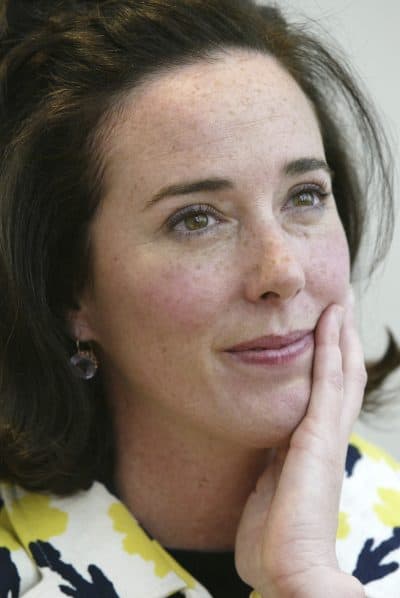Advertisement
Commentary
I Know The Devastation Suicide Leaves Behind. I Wish I Didn’t

I've never owned a Kate Spade bag, nor put my children to sleep wearing ruffled, rose-colored onesies branded with the iconic designer's logo.
And I never picked up chef Anthony Bourdain’s memoir, “Kitchen Confidential,” or sat glued to his popular travel show, “Parts Unknown.”
But this week, I feel oddly linked to the two celebrities, because I do know suicide.
Like Ms. Spade and Mr. Bourdain, my husband died by suicide, leaving our daughters and loving family struggling, wondering why.

I am clearly not alone. A new report just out from the CDC finds the suicide rate is up sharply across the U.S., with nearly 45,000 deaths by suicides in 2016. More than half of those who died, the report said, had no “known mental health condition.”
For those of us coping with suicide, such statistics and headlines feel personal.
As with all celebrity suicides since my husband's death in 2014 — Robin Williams and the actress Lucy Gordon, among them — I find myself both drawn to and repulsed by the coverage as I look for parallels and answers: what drove such beloved and seemingly thriving, successful people to take their own lives and, by doing so, shatter so many others.
There's an eerie familiarity to the public comments by Ms. Spade's husband: the disconnect as he acknowledged that his designer wife "suffered from depression" for years, but that her suicide came with "no indication...no warning."
Advertisement
That’s how it appeared to me on the day a police officer came to my door to deliver the grim news that my husband of 12 years was dead: There was no warning — it was a shocker from out of the blue.
Seth, at age 50, had never been diagnosed with a serious mental illness: He was a tenured, much-admired robotics professor at MIT. Our two daughters adored him, as did his large, close-knit family, his students and longtime friends — buddies from graduate school at UC Berkeley; the guys he played ultimate frisbee with weekly for 20 years; Cambridge neighbors we confided in as our children grew.
Of course, each individual suicide is unique. But the pain of those left behind is universal.
Nothing, not even years of depression — or, in Seth’s case, the moodiness we all attributed to the highs and lows of a brilliant mind — can prepare a family for suicide. It’s a death like no other; a violation of our most powerful instincts. But as I’ve learned, suicide is the terrible side effect of illness, and, like cancer, it’s not a choice one makes: It doesn’t matter how much you love your children and family, it’s a result of a killer disease.
Of course, each individual suicide is unique. But the pain of those left behind is universal. I grieve for Ms. Spade’s teenage daughter, for Mr. Bourdain’s, and for all the children in mourning, knowing that for me, the heartbreak my own daughters faced has been the source of my deepest anxiety since Seth’s death. I’ve been a journalist for over two decades and generally side with reporters when it comes to disclosing important information, but I simply cannot fathom the public good of quoting from Ms. Spade’s suicide note, including the final, intimate words she left to her child.
I have one hope for the daughters of Ms. Spade and Mr. Bourdain: that they are held close by family and loving friends; that they know this harrowing, life-altering moment will not last forever; and that the keen vision, passion and drive of their lost parents will, in time, become a source of strength. In all likelihood, it was Ms. Spade and Mr. Bourdain’s love for their children that kept them going, through all the long, hard years.
If you need help, please call The National Suicide Prevention Lifeline at 1-800-273-TALK (8255). The International Association for Suicide Prevention and Befrienders Worldwide also can provide contact information for crisis centers around the world.
Rachel Zimmerman, a longtime health reporter, is working on a book about her husband’s suicide. She lives in Cambridge with her daughters.
